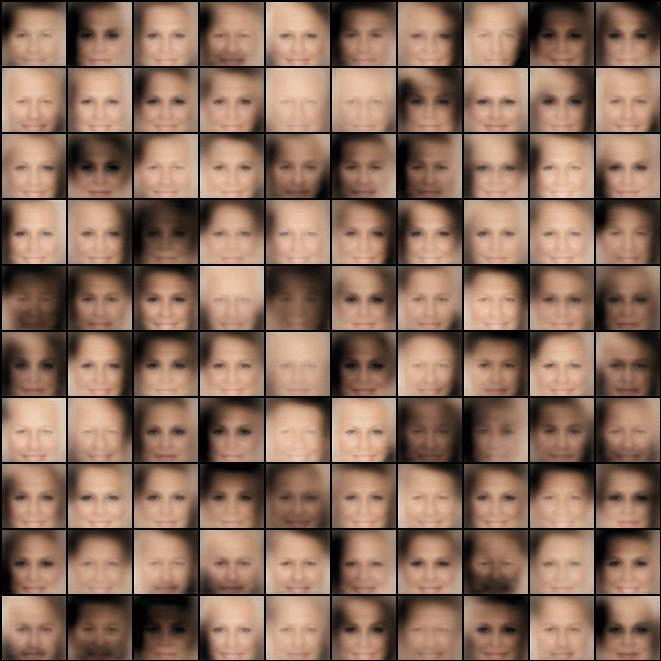Tensorflow implementation of CausalGAN: Learning Causal Implicit Generative Models with Adversarial Training
- Python 2.7
- Pillow
- tqdm
- requests (Only used for downloading CelebA dataset)
- TensorFlow 1.1.0
First download CelebA datasets with:
$ apt-get install p7zip-full # ubuntu
$ brew install p7zip # Mac
$ pip install tqdm
$ python download.py
The CausalGAN/CausalBEGAN code factorizes into two components, which can be trained or loaded independently: the causal_controller module specifies the model which learns a causal generative model over labels, and the causal_dcgan or causal_began modules learn a GAN over images given those labels. We denote training the causal controller over labels as "pretraining" (--is_pretrain=True), and training a GAN over images given labels as "training" (--is_train=True)
To train a causal implicit model over labels and then over the image given the labels use
$ python main.py --causal_model big_causal_graph --is_pretrain True --model_type began --is_train True
where "big_causal_graph" is one of the causal graphs specified by the keys in the causal_graphs dictionary in causal_graph.py.
Alternatively, one can first train a causal implicit model over labels only with the following command:
$ python main.py --causal_model big_causal_graph --is_pretrain True
One can then train a conditional generative model for the images given the trained causal generative model for the labels (causal controller), which yields a causal implicit generative model for the image and the labels, as suggested in [arXiv link to the paper]:
$ echo CC-MODEL_PATH='./logs/celebA_0810_191625_0.145tvd_bcg/controller/checkpoints/CC-Model-20000'
$ python main.py --causal_model big_causal_graph --pt_load_path $CC-MODEL_PATH --model_type began --is_train True
Instead of loading the model piecewise, once image training has been run once, the entire joint model can be loaded more simply by specifying the model directory:
$ python main.py --causal_model big_causal_graph --load_path ./logs/celebA_0815_170635 --model_type began --is_train True
Tensorboard visualization of the most recently created model is simply (as long as port 6006 is free):
$ python tboard.py
To interact with an already trained model I recommend the following procedure:
ipython
In [1]: %run main --causal_model big_causal_graph --load_path './logs/celebA_0815_170635' --model_type 'began'
For example to sample N=22 interventional images from do(Smiling=1) (as long as your causal graph includes a "Smiling" node:
In [2]: sess.run(model.G,{cc.Smiling.label:np.ones((22,1), trainer.batch_size:22})
Conditional sampling is most efficiently done through 2 session calls: the first to cc.sample_label to get, and the second feeds that sampled label to get an image. See trainer.causal_sampling for a more extensive example. Note that is also possible combine conditioning and intervention during sampling.
In [3]: lab_samples=cc.sample_label(sess,do_dict={'Bald':1}, cond_dict={'Mustache':1},N=22)
will sample all labels from the joint distribution conditioned on Mustache=1 and do(Bald=1). These label samples can be turned into image samples as follows:
In [4]: feed_dict={cc.label_dict[k]:v for k,v in lab_samples.iteritems()}
In [5]: feed_dict[trainer.batch_size]=22
In [6]: images=sess.run(trainer.G,feed_dict)
Since this really controls training of 3 different models (CausalController, CausalGAN, and CausalBEGAN), many configuration options are available. To make things managable, there are 4 files corresponding to configurations specific to different parts of the model. Not all configuration combinations are tested. Default parameters are gauranteed to work.
configurations: ./config.py : generic data and scheduling ./causal_controller/config : specific to CausalController ./causal_dcgan/config : specific to CausalGAN ./causal_began/config : specific to CausalBEGAN
For convenience, the configurations used are saved in 4 .json files in the model directory for future reference.
We show convergence in TVD for Causal Graph 1 (big_causal_graph in causal_graph.py), a completed version of Causal Graph 1 (complete_big_causal_graph in causal_graph.py, and an edge reversed version of the complete Causal Graph 1 (reverse_big_causal_graph in causal_graph.py). We could get reasonable marginals with a complete DAG containing all 40 nodes, but TVD becomes very difficult to measure. We show TVD convergence for 9 nodes for two complete graphs. When the graph is incomplete, there is a "TVD gap" but reasonable convergence.
We trained a causal implicit generative model assuming we are given the following causal graph over labels: For the following images when we condition or intervene, these operations can be reasoned about from the graph structure. e.g., conditioning on mustache=1 should give more male whereas intervening should not (since the edges from the parents are disconnected in an intervention).
For each label, images were randomly sampled by either intervening (top row) or conditioning (bottom row) on label=1.
For each label, images were randomly sampled by either intervening (top row) or conditioning (bottom row) on label=1.
<--- Repo originally forked from these two
- Generative Adversarial Networks
- Unsupervised Representation Learning with Deep Convolutional Generative Adversarial Networks
- Wasserstein GAN
- BEGAN: Boundary Equilibrium Generative Adversarial Networks
Christopher Snyder / @22csnyder Murat Kocaoglu / @mkocaoglu





















